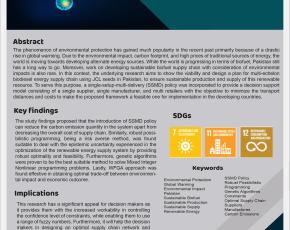Abstract
The phenomenon of environmental protection has gained much popularity in the recent past primarily because of a drastic rise in global warming. Due to the environmental impact, carbon footprint, and high prices of traditional sources of energy, the world is moving towards developing alternate energy sources. While the world is progressing in terms of biofuel, Pakistan still has a long way to go. Moreover, work on developing sustainable biofuel supply chain with consideration of environmental impacts is also rare. In this context, the underlying research aims to show the viability and design a plan for multi-echelon biodiesel energy supply chain using JCL seeds in Pakistan, to ensure sustainable production and supply of this renewable resource. To serve this purpose, a single-setup-multi-delivery (SSMD) policy was incorporated to provide a decision support model consisting of a single supplier, single manufacturer, and multi retailers with the objective to minimize the transport distances and costs to make the proposed framework a feasible one for implementation in the developing countries.
Key findings
The study findings proposed that the introduction of SSMD policy can reduce the carbon emission quantity in the system apart from decreasing the overall cost of supply chain. Similarly, robust possibilistic programming, being a risk averse method, was found suitable to deal with the epistemic uncertainty experienced in the optimization of the renewable energy supply system by providing robust optimality and feasibility. Furthermore, genetic algorithms were proven to be the best suitable method to solve Mixed Integer Nonlinear programming problems. Lastly, WFGA approach was found effective in obtaining optimal trade-off between environmental impact and economic outcome.
Implications
This research has a significant appeal for decision makers as it provides them with the increased workability in controlling the confidence level of constraints, while enabling them to use a range of fuzzy numbers. Furthermore, it will help the decision makers in designing an optimal supply chain network and obtain efficient solutions while allowing them to effectively manage their regional dynamics.













